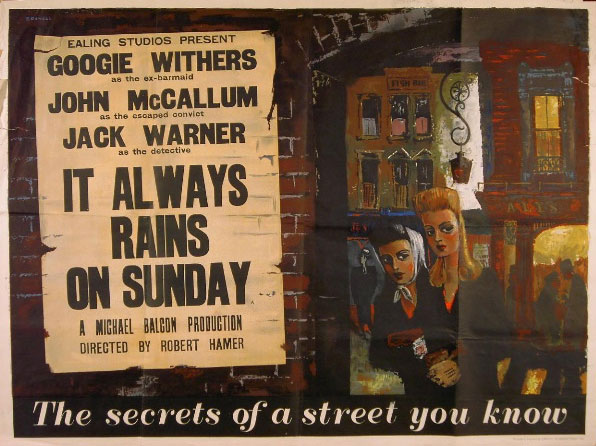
IT ALWAYS RAINS ON SUNDAY
UK, 1947, 92 minutes, Black and white.
Googie Withers, John Mc Callum, Jack Warner, Edward Chapman, Susan Shaw, Sidney Tafler.
Directed by Robert Hamer.
It Always Rains on Sunday was a significant drama of the 1940s. It was a production of Ealing Studios, noted for their dramas, but better known for their comedies.
The Ealing Studios productions focused on day-to-day life in England in the '40s 'and '50s. This is a strong slice of life - anticipating some of the dramas that were to come at the end of the '50s. The film focuses on a particular area of London over one day, an escaped convict a bickering family, fidelity and infidelity in relationships, criminals, the police. The film is well-acted and this gives strength to the gallery of characters presented.
While the material was strong in the '40s with the advent of strong British drama after John Osborne and the angry young authors of the time as-well as the drama on television, the film might seem rather ordinary. However, its historical importance is quite significant - it was co-written by Angus Mc Phail, director-writer Henry Cornelius (Genevieve, I Am A Camera) and the director Robert Hamer, director of many Ealing dramas and comedies.
1. The impact of the film in its time? On English film-making? In later decades?
2. Black and white photography, realistic locations, the down-to-earth atmosphere of the characters, situations? The interplay of the various characters and their stories? Their being linked together? The mood, atmosphere? Musical score?
3. The title and the Sunday of the screenplay, the rain, the atmosphere of the dismal, gloom? A gloomy picture of life in a part of London? The part of London as a microcosm for England? For human nature?
4. The focus on one day in the particular area? The effect of the day and the incidents on each of the characters?
5. Rose and her waking up, her relationship with George, the bickering with the daughters, with her son? The dreary day? Tommy coming and her having to hide him, awakening her memories, the police warning her, sheltering him upstairs, hiding him from the rest of the family, giving him food? The memories of the past? Her not waiting for him? Her marrying? Her not going to the pub with her husband? The reporter coming, Tommy’s hitting him and bashing her, escaping? The reconciliation with George in the hospital? The clashes with the stepdaughters and their hostility towards Rose?
6. The Sandigate family: George as a good man, his love for his daughters, his son? The routine of the Sunday? His love for Rose, meals, cups of tea, the Sunday roast? Rose deceiving him? His going to the pub and winning the darts competition? His being with her in the hospital? Doris and her devotion, the clash with Ted, the job, the reconciliation?
7. Vi and her clashes? Their sharing the room, the squabbles, the sewing, the mirror? Vi and her coming home tight, late in the morning, waking up, self-centred? Morrie and his promises, the flashback to the night before and his encouraging her singing? The visit to the shop, meeting her brother and the bribery with the mouth organ? Her hopes of a career, singing? Clashes at home, antagonism towards Rose, the incident with the mirror and the locked door? Her father's reaction? Her leaving home, ringing Morrie at home, meeting him, at the club, his wife walking out on him, her having to return hone? Hopes dashed? Morrie and his style, playing in the band, encouraging Vi, the liaison with her? His wife and her telling him the truth? His pretence over the phone, putting Vi off, his wife telling him she was leaving, his pursuing her?
8. Tommy and his escape, the visualising of the escape from Dartmoor, the criminals around the town knowing about it, desperate, going to Rose, food and rest, memories of the past, going to South Africa, escaping, knocking down the reporter, his being chased, the bike, the train yard and its drama, his being caught?
9. Fothergill and the rounds, the role of the police, knowing the locals, the three criminals and moving them on, buying them drinks, chasing Whitey, Whitey and his killing the wealthy man?
10. The three criminals and their wandering around, the job with the skates, Fothergill knowing it, their comments amongst themselves, going to the fence and trying to get rid of the skates, Whitey and his slow-wittedness, antagonism, murdering the fence, the encounter with Tommy, trying to pretend that he had killed him? Fothergill arresting him?
11. The couple running the centre, wanting the donations, the brother and his betting, the boxing and the boxer taking a fall, the donation?
12. The atmosphere of London streets, the shops, the markets, the club, the dancing? The pubs?
13. A slice of life? Of its times? human nature and behaviour? Universal validity?